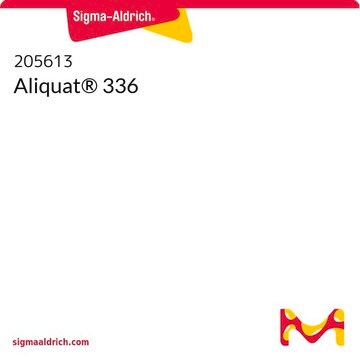255165
Tributylmethylammonium chloride solution
75 wt. % in H2O
Synonym(s):
Methyltributylammonium chloride solution
About This Item
Recommended Products
vapor pressure
7.9 mmHg ( 25 °C)
concentration
75 wt. % in H2O
refractive index
n20/D 1.4682
bp
152 °C
density
0.964 g/mL at 25 °C
SMILES string
[Cl-].CCCC[N+](C)(CCCC)CCCC
InChI
1S/C13H30N.ClH/c1-5-8-11-14(4,12-9-6-2)13-10-7-3;/h5-13H2,1-4H3;1H/q+1;/p-1
InChI key
IPILPUZVTYHGIL-UHFFFAOYSA-M
General description
Application
Signal Word
Warning
Hazard Statements
Precautionary Statements
Hazard Classifications
Acute Tox. 4 Dermal - Aquatic Chronic 2 - Eye Irrit. 2 - Skin Irrit. 2
Storage Class Code
10 - Combustible liquids
WGK
WGK 2
Flash Point(F)
Not applicable
Flash Point(C)
Not applicable
Personal Protective Equipment
Certificates of Analysis (COA)
Search for Certificates of Analysis (COA) by entering the products Lot/Batch Number. Lot and Batch Numbers can be found on a product’s label following the words ‘Lot’ or ‘Batch’.
Already Own This Product?
Find documentation for the products that you have recently purchased in the Document Library.
Our team of scientists has experience in all areas of research including Life Science, Material Science, Chemical Synthesis, Chromatography, Analytical and many others.
Contact Technical Service










